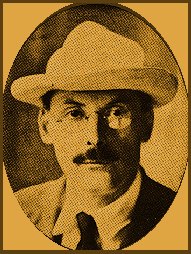
Minniver Cheevy
(1897)

Edward Arlington Robinson, the only other poet to win more than one Pulitzer Prize (three, in fact), was an American storytelling poet whose fusion of everyday language, a bleak vision, and a sharply honed metrical and formal craft put him quite at odds with that great demotic poet Whitman, whose rhapsodic optimism, at least in his earlier poems, seems to be from another world altogether than Robinson's. Such divisions mark American life as surely as those between dreams and being awake. One cannot have one without the other.
1910
Miniver Cheevy, child of scorn,
Grew lean while he assailed the seasons;
He wept that he was ever born,
And he had reasons.
Miniver loved the days of old
When swords were bright and steeds were prancing;
The vision of a warrior bold
Would set him dancing.
Miniver sighed for what was not,
And dreamed, and rested from his labors;
He dreamed of Thebes and Camelot,
And Priam's neighbors.
Miniver mourned the ripe renown
That made so many a name so fragrant;
He mourned Romance, now on the town,
And Art, a vagrant.
Miniver loved the Medici,
Albeit he had never seen one;
He would have sinned incessantly
Could he have been one.
Miniver cursed the commonplace
And eyed a khaki suit with loathing;
He missed the mediaeval grace
Of iron clothing.
Miniver scorned the gold he sought,
But sore annoyed was he without it;
Miniver thought, and thought, and thought,
And thought about it.
Miniver Cheevy, born too late,
Scratched his head and kept on thinking;
Miniver coughed, and called it fate,
And kept on drinking.
E.A. Robinson, 1910
Robinson's poems could turn on both themselves and the reader's expectations, as in this familiar but unforgettable poem about a suicide:
Whenever Richard Cory went down town,
We people on the pavement looked at him:
He was a gentleman from sole to crown,
Clean favored, and imperially slim.
And he was always quietly arrayed,
And he was always human when he talked;
But still he fluttered pulses when he said,
"Good-morning," and he glittered when he walked.
And he was rich- yes, richer than a king-
And admirably schooled in every grace:
In fine, we thought that he was everything
To make us wish that we were in his place.
So on we worked, and waited for the light,
And went without the meat, and cursed the bread;
And Richard Cory, one calm summer night,
Went home and put a bullet through his head.
E.A. Robinson, 1897